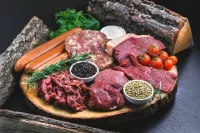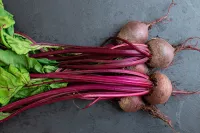What is Vegetarianism?
A vegetarian is someone who doesn’t eat meat, fish or poultry. However, there are actually many different forms of vegetarians. For instance, some will eat eggs and dairy products, others may avoid eggs but eat dairy products, some will eat fish, and so on. In its strictest form, vegetarianism becomes veganism, which means that all animal-derived products are avoided, such as honey.
Vegetarian Foods
If you are following a vegetarian diet, it is important to eat a diverse range of fruits, vegetables, grains, healthy fats and proteins to ensure that your body receives all of the nutrients that it needs. In particular, you need to replace the protein that normally comes from meat, so you should aim to eat protein-rich plant foods, such as nuts, seeds, legumes, tempeh, tofu and seitan.
You can obtain a number of important vitamins and minerals from nutrient-dense whole foods, such as fruits, vegetables and whole grains.
Examples of healthy foods you should try to eat include:
- Fruits - apples, bananas, berries, oranges, melons, pears, peaches
- Vegetables - leafy greens, asparagus, broccoli, tomatoes, carrots
- Grains - quinoa, barley, buckwheat, rice, oats
- Legumes - lentils, beans, peas, chickpeas.
- Nuts - almonds, walnuts, cashews, chestnuts
- Seeds - flaxseeds, chia and hemp seeds
- Healthy fats - coconut oil, olive oil, avocados
- Proteins - tempeh, tofu, seitan, natto, nutritional yeast, spirulina, eggs, dairy products
Health Benefits of a Vegetarian Diet
While you will have to make more of an effort to ensure your body is obtaining all the required nutrients, there are a number of health benefits to following a vegetarian diet.
To begin with, following a vegetarian diet can actually help you lose weight. Many studies have found that vegetarians are able to lose weight faster than those who eat meat. One study of close to 61,000 adults found that vegetarians tend to have a lower BMI than omnivores.
There is also research emerging that following a vegetarian diet may lower the risk of certain cancers, such as breast, colon, rectum and stomach. Further research is needed in this field, but it is an exciting area.
Those who struggle with diabetes may also benefit from a vegetarian diet. Numerous studies have suggested that vegetarian diets help to maintain healthy blood sugar levels, particularly in those with type 2 diabetes. There is also evidence to suggest it may help to stabilise blood sugar levels in the long term.
The health benefits don’t stop there. Studies have found that vegetarian diets reduce numerous heart disease risk factors. A study of 76 people found that vegetarian diets lower levels of triglycerides, total cholesterol and “bad” LDL cholesterol. There is also research that suggests vegetarianism may help to lower blood pressure.
However, there are risks that vegetarians need to be aware of. A vegetarian diet can increase the risk of certain nutritional deficiencies. Meat, poultry and fish are good sources of protein and omega-3 fatty acids, as well as micronutrients such as zinc, selenium, iron and vitamin B12. When you remove meat and fish from your diet, it is vital to ensure that you are still getting enough of these nutrients from other sources.
Many studies have found that vegetarians are at a higher risk of protein, calcium, iron, iodine, and vitamin B12 deficiencies. If you are deficient in any of these, you run the risk of suffering from fatigue, weakness, anaemia, bone loss and thyroid issues.
As discussed above, this can be avoided by eating a variety of fruits, vegetables, whole grains, protein, fortified foods, and so on. You can also take multivitamin supplements just to make sure that things are covered.
Meal Ideas
Here is an example meal plan that you could follow for a week:
Monday
- Breakfast: Oatmeal with fruit and flaxseeds
- Lunch: Grilled veggie and hummus wrap with sweet potato fries
- Dinner: Tofu banh mi sandwich with pickled slaw
Tuesday
- Breakfast: Whole-wheat toast with avocado and nutritional yeast
- Lunch: Marinated tofu pita pocket with Greek salad
- Dinner: Quinoa-black-bean meatballs with zucchini noodles
Wednesday
- Breakfast: Tofu scramble with sauteed peppers, onions and spinach
- Lunch: Burrito bowl with brown rice, beans, avocado, salsa and veggies
- Dinner: Vegetable paella with a side salad
Thursday
- Breakfast: Greek yogurt with chia seeds and berries
- Lunch: Farro salad with tomatoes, cucumber and feta with spiced lentil soup
- Dinner: Eggplant parmesan with a side salad
Friday
- Breakfast: Scrambled eggs with tomatoes, garlic and mushrooms
- Lunch: Zucchini boats stuffed with veggies and feta with tomato soup
- Dinner: Chickpea curry with basmati rice
Saturday
- Breakfast: Smoothie of kale, berries, bananas, nut butter and almond milk
- Lunch: Red lentil veggie burger with avocado salad
- Dinner: Flatbread with grilled garden vegetables and pesto
Sunday
- Breakfast: Kale and sweet potato hash
- Lunch: Bell peppers stuffed with tempeh with zucchini fritters
- Dinner: Black bean tacos with cauliflower rice

 The Different Types of Meat
The Different Types of Meat How to Cook Beetroot
How to Cook Beetroot



